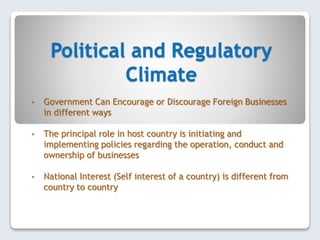Political and regulatory climate
- 1. Political and Regulatory Climate • Government Can Encourage or Discourage Foreign Businesses in different ways • The principal role in host country is initiating and implementing policies regarding the operation, conduct and ownership of businesses • National Interest (Self interest of a country) is different from country to country
- 2. Goals of national Interest  Self – Preservation  Security (minimizing threats from outside)  Prosperity (improving Living Condition)  Prestige  Ideology (protect Ideology in combination with other goals)  Cultural Identity
- 3. National Sovereignty Sovereignty is the Complete control exercised with in a given geographic area, including the ability to pass laws and regulations and the power to enforce them
- 4. HOST GOVERNMENT ACTIONS  Government Subsidies Popular Instrument used to attract foreign investment . Governments are use direct or indirect subsidies to encourage firms to export goods  Ownership Restriction E.g. – India’s Foreign Exchange Act in 1973 ( Foreign Ownership could not exceed 40%) Coke and IBM – Coke negotiated
- 5. ď‚— Operating Conditions Host Countries control firms in the areas of product design and packaging ,pricing, advertising, sales promotion and distribution Companies should seriously consider these constraints before entering a market E.g. - Mexico City ď‚— Boycotts of Firms Government Boycotts tend to shut some companies completely out of a given market E.g.- Coca-Cola in Israeli (Totally Banned)
- 6.  Take overs Takeovers are any Host- Government –initiated actions that result in a loss of ownership or direct control by the foreign company (Take the power of the company) An expropriation ( taking out of an owners hands) is a formal seizure of an operation A confiscation( Seizure by the government) is an expropriation without compensation
- 7. LEGAL ENVIRONMENTS ď‚— Common Law Countries take parts in British commonwealth ď‚— Civil Law Roman Tradition , Judges Play a Important role, Trade mark Protection ď‚— Islam Law Koran and Islamic Traditions, bank interest policy ď‚— Socialist Law Marxist Ideological system established in china, Russia and other former eastern bloc countries
- 8. National Regulatory Environments ď‚— This is also Vary Among Countries ď‚— Business Face Grater Regulatory Burdens in developing countries than they do in developed countries E.g.- It takes 21 steps to register a commercial property in Nigeria compared with only 3 steps in Finland
- 9. LEGAL EVOLUTION ď‚— Product liability the area of law in which manufacturers, distributors, suppliers, retailers, and others who make products available to the public are held responsible for the injuries those products cause. (tangible personal property) ď‚— Bankruptcy bankruptcy is something you must do to take action and be held responsible (this is also different country to country ) ď‚— Regulating Cyberspace
- 10. Attitude Toward Rules Attitudes toward rules are affected by two criteria:  Level of power distance  Type of human nature orientation HNO – Human Nature Orientation  Positive HNO – assume people can be trusted to obey the rules  Negative HNO – assume people cannot be trusted to obey the rules
- 11. Regulatory Change  International marketers must understand the different political and regulatory climates in which they operate  Preparation is important to deal with changes  These changes can be moderate or drastic  And they can be less or more predictive E.g. – Taxes , price controls, revision of labeling
- 12. Managing Regulatory Change ď‚— Alter Bargain to get government to change regulations ď‚— Avoid Move to bypass the impact of the regulation ď‚— Accede ( agree or express agreement) Adjust its Operation to comply with a government requirements ď‚— Ally ( A friendly nation) Avoid some risks by seeking strategic alliances
- 14. REGULATORY RISK VS POLITICAL RISK ď‚— Regulatory Change More moderate and predictable changes in the business environment ď‚— Political risk More unexpected and drastic changes
- 15. Risk Reduction Strategies Relay On Local Partner's who have excellent contacts with Government
- 16.  Starbucks pulled out of Israel because they feared a terrorist attack  GE criticized by a senator for taking “blood money” from a state that supports terrorism (Iran)  Governments and companies spend lots of money to protect infrastructure, plant, equipment, and people
- 17. Prepared BY

















